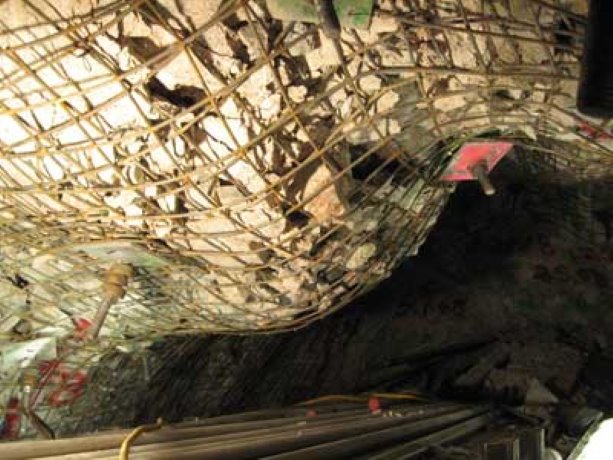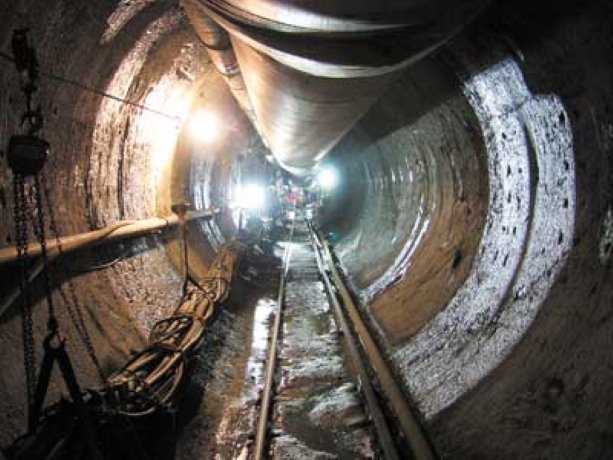The German company hired to construct twin tunnels for a water filtration project in North Vancouver is launching a lawsuit against Metro Vancouver and placing a lien against the project.
The German company hired to construct twin tunnels for a water filtration project in North Vancouver is launching a lawsuit against Metro Vancouver and placing a lien against the project.
Metro Vancouver hired Bilfinger Berger Canada (BBC) Inc. in 2004 to construct twin tunnels with a combined length of 14.2 kilometres for the Capilano-Seymour water filtration project.
Work on the $100 million project was suspended by BBC in January 2008, due to concerns about the safety of underground workers.
Bilfinger Berger filed a suit in B.C. Supreme Court against Metro Vancouver on June 26, which alleges Metro Vancouver improperly cancelled the contract and failed to develop a viable and safe plan for completion of the project.
“This is a big disappointment to Bilfinger Berger,” said Nick Woodward, commercial manager with BBC.
“We took a position in relation to worker safety, which resulted from two major rock bursts in the Raw Water Tunnel.”
A series of overstress failures of the rock in the tunnels occurred in late 2007 and January 2008.
“These failures were unexpected, dangerous and caused Bilfinger Berger to have grave concerns about the safety of the project and the viability of continuing to tunnel as planned with the specified TBMs (tunnel boring machines),” said the court document.
Metro Vancouver terminated BBC’s right to perform further work on the project in May.
According to Metro Vancouver, BBC refused to proceed with work, even though they were provided with a comprehensive and viable plan for completion.
“It is the opinion of three of the world’s top experts in tunneling and rock mechanics that the plan to address Bilfinger Berger’s concerns was appropriate and could proceed safely,” said Bill Morrell, media relations and corporate communications manager with Metro Vancouver, .
“Tunnel support was anticipated in other areas of the tunnel and could be applied to deal with this specific problem.”
Metro Vancouver argues that the steel ribs, rock bolts and welded wire mesh as specified in the contract are sufficient, safe and viable in the current conditions.
In sharp contrast to this position, BBC argues that Metro Vancouver and their engineer Hatch Mott Macdonald (HMM) are responsible for the project design and for all risks arising from baseline conditions being different than those set out in the geotechnical report.
“Our position is that their (Metro Vancouver) design does not recognize the dynamic load and explosive nature of rock bursting,” said Woodward.
“The initial assessment of the geology does not consider the high level of pressure in the rock. What they put forward was a range of recommendations, not a design to complete the tunnel.”
A letter from the unions representing former workers at the job site supports BBC’s claim that it had to shut the project down because of workplace safety concerns.
“After our members were injured and exposed to unsafe conditions at the site, Bilfinger Berger made the correct decision to temporarily suspend the work pending a review and analysis of the rock behaviour,” said the letter, which was signed by the leaders of the International Union of Operating Engineers, the Construction and Specialized Workers Union and the International Brotherhood of Electrical Workers.
According to Woodward, BBC advised Metro Vancouver that testing needed to be undertaken to prepare a safe and viable design solution.
“In our dealing with Metro Vancouver, we asked them to undertake a number of tests to look at rock strength, in situ stress levels and the length of the tunnel that may be affected by the fault zone,” said Woodward. “We wanted to use an independent analyst to do the (strength) tests, but Metro Vancouver refused the offer.”
Woodward said that stress tests were eventually undertaken, but that they had not been completed or released on May 26, when Metro Vancouver terminated BBC’s right to perform further work on the project.
As a result of this situation, Bilfinger is suing Metro Vancouver for more than $22 million and is putting a Builders Lien against title to the lands in an attempt to secure the claim.
“From the time of the tunneling stoppage, Metro Vancouver has refused or otherwise failed to pay any of the costs of Bilfinger Berger’s labour, materials and equipment to maintain its forces in readiness to continue work,” said the court documents.
“As of June 13, 2008, the amounts outstanding from Metro Vancouver to Bilfinger Berger for these unpaid invoices, unpaid holdback and applicable taxes total $22,549,579.46, excluding accruing interest.”
BBC is making the claim for this outstanding amount against Metro Vancouver, the engineer HMM and the land owner the District of North Vancouver.
BBC is also seeking a court order for the return of more than $35 million worth of equipment and buildings at the site that are owned or leased by BBC. This total includes two tunnel boring machines worth about $8 million each.

The Seymour-Capilano twin tunnel project.











Recent Comments
comments for this post are closed